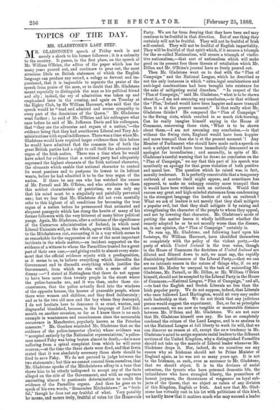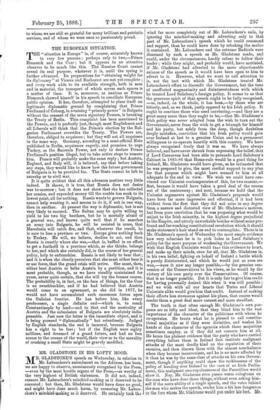TOPICS OF THE DAY.
MR. GLADSTONE'S LAST STEP.
MR. GLADSTONE'S speech of Friday week is not merely a shock to his former followers ; it is a calamity to the country. It passes, in the first place, on the speech of Mr. William O'Brien, the editor of the paper which has for many years poured out, and continues to pour out, the most atrocious libels on British statesmen of which the English language can produce any record, a eulogy so fervent and im- passioned, that it is impossible to separate the praise of the speech from praise of the man, or to doubt that Mr. Gladstone meant especially to distinguish the man as his political friend and ally ; indeed, the cry of admiration was taken up and emphasised later in the evening, and again on Tuesday at the Eighty Club, by Sir William Harcourt, who said that the speech would be "read and admired and arouse sympathy in every part of the dominions of the Queen." Mr. Gladstone went further ; he said of Mr. O'Brien and his colleagues what once before he said of Mr. Jefferson Davis and his colleagues, that "they are the advocates and organs of a nation,"—the evidence being that they had overthrown Liberal and Tory Ad- ministrations with equal indifference. There was a time when Mr. Gladstone would have required larger evidence than this before he would have admitted that the common foe of both the great British parties had a right to call itself the advocate and organ of the Irish nation. There was a time when he would have asked for evidence that a national party had adequately expressed the highest elements of the Irish national character, the elements which enable that national character to control its worst passions and to postpone its lowest to its loftiest wants, before he had admitted it to be the true organ of the nation. If there be any one who has watched the course of Mr. Parnell and Mr. O'Brien, and who attributes to them this noblest characteristic of patriotism, we can only say that his mind must be a singularly and painfully perverted one ; but we fear that Mr. Gladstone did not even mentally refer to this highest of all conditions for becoming the true organ of a nation before he pronounced that animated and eloquent panegyric which has stung the hearts of many of his former followers with the very bitterest of many bitter political pangs. Again, Mr. Gladstone, after a criticism of the significance of the Carnarvon administration of Ireland, in which most Liberal Unionists will, on the whole, agree with him, went back to the Mitchelstown riot, recounting it in a way which seems to us remarkable for the suppression of one of the most important incidents in the whole matter,—an incident supported on the evidence of a witness to whom the Parneffites trusted for a great part of their own case,—and giving credit to almost every state- ment that the official evidence rejects with a predisposition, as it seems to us, to believe everything which discredits the Government and to discredit everything which justifies the Government, from which we rise with a sense of utter dismay :—" I stated at Nottingham that there do not appear to have been more than twenty people in the street where the police-barracks are, and it was then, under these cir- cumstances, that the police actually fired into the windows of the opposite houses, the houses of peaceable people, where there were women and children, and they fired deliberately ; and as to the two old men and the boy whom they destroyed, I do not hesitate here to denounce it as cruel, wanton, and disgraceful bloodshed, because, in the language of Lord Sid- mouth on another occasion, so far as I know there is no such example in wantonness and causelessness since the memorable occurrence in Manchester, popularly known as the Peterloo massacre." Mr. Goschen reminded Mr. Gladstone that on the evidence of the police-inspector (Irwin) whose evidence was "accepted entirely by the Nationalist representatives," a police- man named Fahy was being beaten almost to death,—he is now suffering from a spinal complaint from which he will never recover,—at the time the three shots were fired, and that Irwin stated that it was absolutely necessary those shots should be fired to save Fahy. We do not pretend to judge between the two statements ; but this we cannot conceal from ourselves, that Mr. Gladstone speaks of the Mitchelstown affray in a tone that shows him to be utterly indisposed to accept any of the facts alleged on the side of the Government, and with an eagerness amounting almost to passionate determination to credit the evidence of the Parnellite organs. And then he goes on to speak of his own words, "Remember Mitchelstown 1" as "fruit- ful," though he does not say fruitful of what. Very possibly he means, and means truly, fruitful of votes for the Home-rule Party. We are far from denying that they have been and may continue to be fruitful in that direction. But of one thing they certainly will not be fruitful. They will not be fruitful of Irish self-control. They will not be fruitful of English impartiality. They will be fruitful of that spirit which, if it secures a triumph for the so-called Nationalism, will secure a triumph of vindic- tive nationalism,—that sort of nationalism which will make good on its present foes those threats of retaliation which Mr. Dillon and Mr. O'Brien's journal have so freely poured out. Then Mr. Gladstone went on to deal with the "Plan of Campaign" and the National League, which he described as not the only instances in which "extra-legal combinations and anti-legal combinations had been brought into existence for the sake of mitigating social disorders." "In respect of the 'Plan of Campaign," said Mr. Gladstone, " what is to be shown about it,—I am not assuming any conclusion,—is that without the 'Plan,' Ireland would have been happier and more tranquil than it is at the present moment." Is that really what Mr. Gladstone thinks? He compared the "Plan of Campaign" to the Swing riots, which resulted in so much rick-burning. Can he really imagine himself saying in the House of Commons, concerning those riots, 'What is to be shown about them,—I am not assuming any conclusion,—is that without the Swing riots, England would have been happier and more tranquil than she is at the present moment ' ? Any Member of Parliament who should have made such a speech on such a subject would have been immediately denounced as an apologist for incendiarism ; and assuredly, in spite of Mr. Gladstone's careful warning that he draws no conclusion on the "Plan of Campaign," we say that this part of his speech was manifestly an apology for that gross violation of both positive and moral law. The question which he raised was, in fact, morally irrelevant. It is perfectly conceivable that a temporary outbreak of murder itself might appear, and sometimes has appeared, to make an unhappy country more tranquil than it would have been without such an outbreak. Would that excuse any great and high-minded statesman from condemning in the strongest language the leaders of such an outbreak ? What we ask of leaders is not merely that they shall mitigate a popular evil, but that they shall mitigate it by raising and strengthening the character of the people to whom they appeal, and not by lowering that character. Mr. Gladstone's mode of putting the matter leaves it wholly indifferent whether the remedy adopted be or be not morally worse than the disease, as, in our opinion, the "Plan of Campaign" certainly is.
To sum up, Mr. Gladstone, and following hard upon his footsteps, Sir William Harcourt, have identified themselves so completely with the policy of the violent party,—the party of which United Ireland is the true voice, though in the House of Commons the doctrines of United Ireland are diluted and filtered down to suit, we must say, the rapidly diminishing fastidiousness of the Liberal Party,—that we can see no intrinsic reason in the nature of things why, if on any account Mr. Morley be unequal to the task of succeeding Mr. Gladstone, Mr. Parnell, or Mr. Dillon, or Mr. William O'Brien himself, should not be accepted by the Liberal Party in the House of Commons,—National League, "Plan of Campaign," and all, —to lead the English and Scotch Liberals no less than the Irish popular party. We do not suppose, indeed, that Liberals who once followed Lord Hartington, would sit very easy under such leadership as that. We do not think that any judicious person would suggest the experiment. But, so far as principles are concerned, we see now no tangible or measurable distance between Mr. O'Brien and Mr. Gladstone. We are not sure that Mr. Gladstone himself sees any. He has so completely condoned the crimes of the Land League, and is so anxious to set the National League at full liberty to work its will, that we can discover no reason at all, except the new tendency in Mr. Gladstone's mind to assign separate racial leaders to the different sections of the United Kingdom, why a distinguished Parnellite should not take up the mantle of Liberal leader whenever Mr. Gladstone drops it. Nor, indeed, do we ourselves see any reason why an Irishman should not be Prime Minister of England again, as he was not so many years ago. It is not to the Irishman, as such, even as successor to Mr. Gladstone, that we should object. It is to the devisers of social ostracism, the tyrants who have poisoned domestic life, the intimidators who have strangled liberty, the proscribers of honest jurymen, the threateners of vengeance on loyal sub- jects of the Queen, that we object as rulers of any division of this Kingdom, English or Irish. And now that Mr. Glad- stone has virtually cast in his lot with politicians of this kind, we hardly know that it matters much who may succeed a leader to whom we are still so grateful for many brilliant and patriotic services, and of whom we were once so passionately proud.







































 Previous page
Previous page